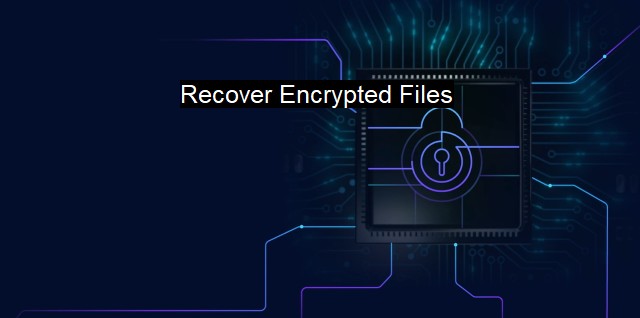What are Recover Encrypted Files?
Recover Encrypted Files: Protecting Sensitive Information In Today's Digital Age
"Recover Encrypted Files" refers to the process of retrieving and restoring digital data that has been locked or rendered inaccessible due to encryption. this task becomes highly significant, as encryption is a common strategy employed by malware and cybercriminals to disrupt access to data, often as part of a destructive cyber-attack or blackmail campaign.Encryption is a double-edged sword. It can be a protective measure, encrypting data to protect it from unauthorized access, but it can also be weaponized by threat actors. In the cybersecurity sphere, malicious encryption often surfaces in the form of ransomware, a type of malware that encrypts a victim’s files and demands a ransom for their decryption key. To recover encrypted files is, therefore, typically a response to such threats.
The process of decrypting and recovering files is often challenging and may require specialized knowledge and tools. It usually involves identifying the type of encryption used, obtaining or recovering the decryption key, and applying it to unlock the encrypted files. In some cases, this process can be expedited by built-in system tools or specialized third-party software designed to thwart encryption-based threats.
Software developers and security companies offer various solutions that assist in the decryption and recovery of encrypted files. Some antivirus and cybersecurity tools are equipped with features that can reverse the effects of particular types of ransomware or encryption. while these solutions can help to protect against known threats, they might not be effective against new and sophisticated forms of malware, which are continually emerging.
While recovery utilities are beneficial, the most assured way of recovering encrypted files is through frequent and regular data backups. Practicing good computer hygiene and maintaining an updated backup of all important data can help decrease the impact of a cyber attack substantially. If users have a recent backup of files that get encrypted, they can restore them without giving in to the demands of the attacker.
There's often a misconception that displaying alert behavior only while browsing the internet is enough to prevent a ransomware attack. While being wary of unknown emails or dubious websites can reduce the risk, keeping operating systems, antivirus software, and other programs updated is equally crucial.
Concerns regarding encrypted files also tie into broader conversations about privacy and data security. While users need encryption to protect sensitive information from external threats, they must also ensure they have the ability to restore access to encrypted data in the event of unexpected issues or forgotten passwords.
Communicating about cybersecurity threats, proactively implementing defense strategies, and sharing information about how to respond when breaches do occur is critically important for both individuals and organizations. Staying informed about evolving threats and the best strategies for protecting data can help ensure the successful decryption and recovery of encrypted files in the wake of a cyber attack.
Hence, "Recover Encrypted Files" is a significant topic that highlights the need for advanced protection mechanisms, vigilance in cyber hygiene, and maintaining up-to-date and regular data backups. It brings to the forefront the balance that must be struck between shielding data from outside threats, while ensuring ready and retrievable access for legitimate purposes. In a world driven by digital data, managing this balance effectively is not just preferable, but crucial to fostering trust, ensuring security, and maintaining operational continuity for individuals and businesses alike.

Recover Encrypted Files FAQs
What should I do if my files got encrypted?
If your files got encrypted, you should immediately disconnect from any network or external storage devices and run a full antivirus scan on your computer. If the antivirus software detects any malware, follow the instructions to remove it.Can I recover my encrypted files without paying the ransom?
In some cases, it may be possible to recover your encrypted files without paying the ransom. You can try using decryption tools offered by antivirus vendors, restoring from backup, or seeking professional help from a cybersecurity company.Is it safe to use a file recovery software to recover encrypted files?
No, it is not safe to use a file recovery software to recover encrypted files because the encryption algorithm used by the malware may have damaged or corrupted the files. Additionally, some file recovery software may not be legitimate and could install more malware onto your computer.How can I prevent my files from getting encrypted in the future?
To prevent your files from getting encrypted in the future, you should regularly update your antivirus software, use strong and unique passwords for all accounts, avoid clicking on suspicious links or downloading attachments from unknown sources. You should also regularly back up your files and store them securely in a location that is physically separate from your computer.| | A | | | B | | | C | | | D | | | E | | | F | | | G | | | H | | | I | | | J | | | K | | | L | | | M | |
| | N | | | O | | | P | | | Q | | | R | | | S | | | T | | | U | | | V | | | W | | | X | | | Y | | | Z | |
| | 1 | | | 2 | | | 3 | | | 4 | | | 7 | | | 8 | | |||||||